UNITED STATES
SECURITIES AND EXCHANGE COMMISSION
Washington, D.C. 20549
SCHEDULE 14A
INFORMATION REQUIRED IN PROXY STATEMENT
Proxy Statement Pursuant to Section 14(a) of the Securities Exchange Act of 1934
Filed by the Registrant ☒
Filed by a Party other than the Registrant ☐
Check the appropriate box:
| | |
| ☐ | | Preliminary Proxy Statement |
| |
| ☐ | | Confidential, for Use of the Commission Only (as permitted by Rule 14a-6(e)(2)) |
| |
| ☐ | | Definitive Proxy Statement |
| |
| ☒ | | Definitive Additional Materials |
| |
| ☐ | | Soliciting Material Pursuant to § 240.14a-12 |
BlackRock Muni New York Intermediate Duration Fund, Inc.
(Name of Registrant as Specified In Its Charter)
(Name of Person(s) Filing Proxy Statement, if Other than the Registrant)
Payment of Filing Fee (Check the appropriate box):
| | | | |
| |
| ☒ | | No fee required. |
| |
| ☐ | | Fee computed on table below per Exchange Act Rules 14a-6(i)(4) and 0-11. |
| | |
| | (1) | | Title of each class of securities to which transaction applies: |
| | (2) | | Aggregate number of securities to which transaction applies: |
| | (3) | | Per unit price or other underlying value of transaction computed pursuant to Exchange Act Rule 0-11 (set forth the amount on which the filing fee is calculated and state how it was determined): |
| | (4) | | Proposed maximum aggregate value of transaction: |
| | (5) | | Total fee paid: |
| |
| ☐ | | Fee paid previously with preliminary materials. |
| |
| ☐ | | Check box if any part of the fee is offset as provided by Exchange Act Rule 0-11(a)(2) and identify the filing for which the offsetting fee was paid previously. Identify the previous filing by registration statement number, or the Form or Schedule and the date of its filing. |
| | |
| | (1) | | Amount Previously Paid: |
| | (2) | | Form, Schedule or Registration Statement No.: |
| | |
| | (3) | | Filing Party: |
| | (4) | | Date Filed: |
On June 25, 2019, representatives of BlackRock Muni New York Intermediate Duration Fund, Inc. (the “Fund”) gave a presentation to representatives of each of Institutional Shareholder Services Inc. and Glass, Lewis & Co. regarding the Fund. A copy of this presentation is filed herewith.
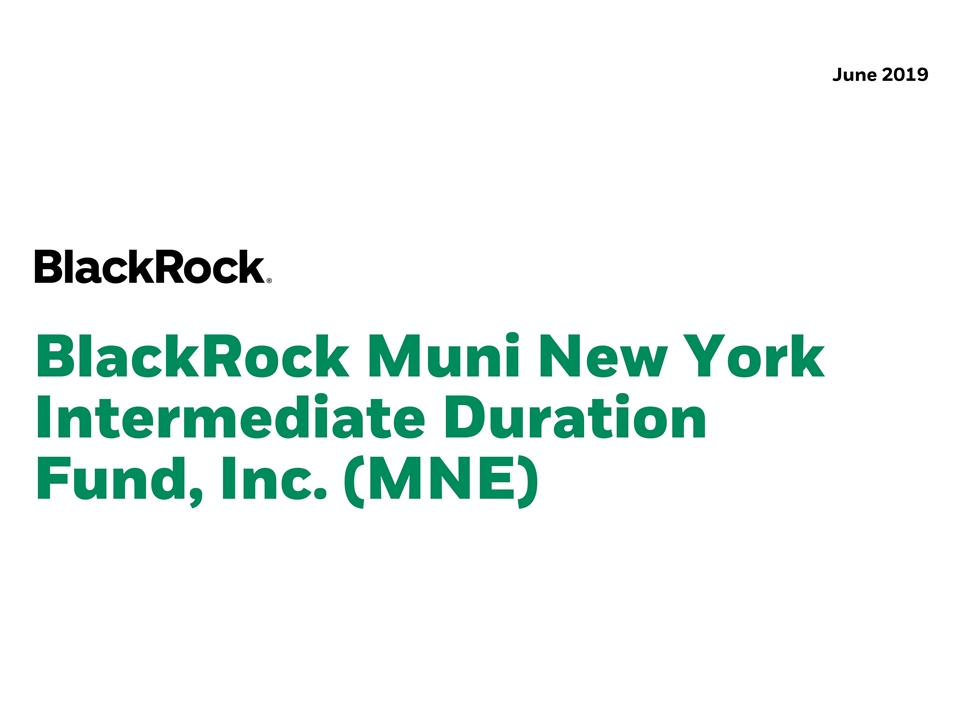
BlackRock Muni New York Intermediate Duration Fund, Inc. (MNE) June 2019
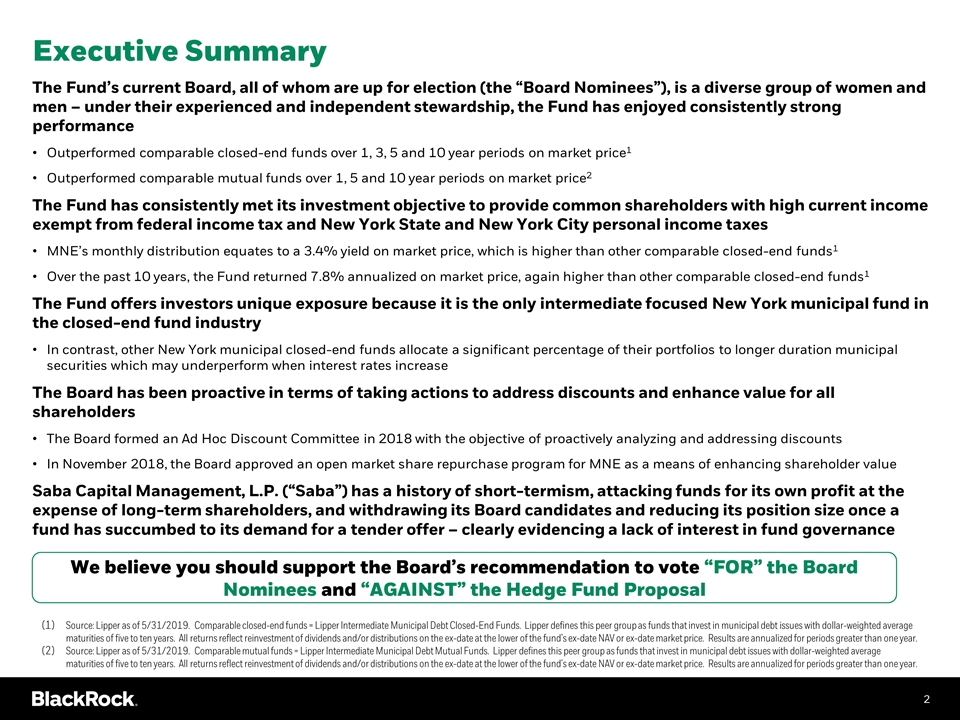
Executive Summary The Fund’s current Board, all of whom are up for election (the “Board Nominees”), is a diverse group of women and men – under their experienced and independent stewardship, the Fund has enjoyed consistently strong performance Outperformed comparable closed-end funds over 1, 3, 5 and 10 year periods on market price1 Outperformed comparable mutual funds over 1, 5 and 10 year periods on market price2 The Fund has consistently met its investment objective to provide common shareholders with high current income exempt from federal income tax and New York State and New York City personal income taxes MNE’s monthly distribution equates to a 3.4% yield on market price, which is higher than other comparable closed-end funds1 Over the past 10 years, the Fund returned 7.8% annualized on market price, again higher than other comparable closed-end funds1 The Fund offers investors unique exposure because it is the only intermediate focused New York municipal fund in the closed-end fund industry In contrast, other New York municipal closed-end funds allocate a significant percentage of their portfolios to longer duration municipal securities which may underperform when interest rates increase The Board has been proactive in terms of taking actions to address discounts and enhance value for all shareholders The Board formed an Ad Hoc Discount Committee in 2018 with the objective of proactively analyzing and addressing discounts In November 2018, the Board approved an open market share repurchase program for MNE as a means of enhancing shareholder value Saba Capital Management, L.P. (“Saba”) has a history of short-termism, attacking funds for its own profit at the expense of long-term shareholders, and withdrawing its Board candidates and reducing its position size once a fund has succumbed to its demand for a tender offer – clearly evidencing a lack of interest in fund governance We believe you should support the Board’s recommendation to vote “FOR” the Board Nominees and “AGAINST” the Hedge Fund Proposal Source: Lipper as of 5/31/2019. Comparable closed-end funds = Lipper Intermediate Municipal Debt Closed-End Funds. Lipper defines this peer group as funds that invest in municipal debt issues with dollar-weighted average maturities of five to ten years. All returns reflect reinvestment of dividends and/or distributions on the ex-date at the lower of the fund’s ex-date NAV or ex-date market price. Results are annualized for periods greater than one year. Source: Lipper as of 5/31/2019. Comparable mutual funds = Lipper Intermediate Municipal Debt Mutual Funds. Lipper defines this peer group as funds that invest in municipal debt issues with dollar-weighted average maturities of five to ten years. All returns reflect reinvestment of dividends and/or distributions on the ex-date at the lower of the fund’s ex-date NAV or ex-date market price. Results are annualized for periods greater than one year.
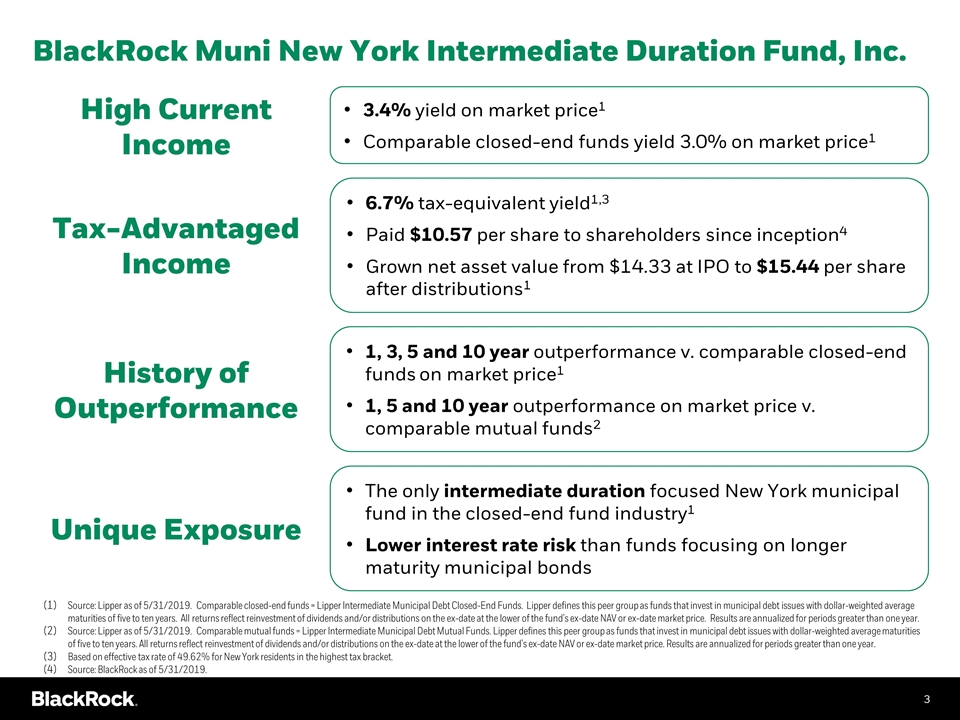
BlackRock Muni New York Intermediate Duration Fund, Inc. High Current Income 3.4% yield on market price1 Comparable closed-end funds yield 3.0% on market price1 Tax-Advantaged Income 6.7% tax-equivalent yield1,3 Paid $10.57 per share to shareholders since inception4 Grown net asset value from $14.33 at IPO to $15.44 per share after distributions1 Unique Exposure The only intermediate duration focused New York municipal fund in the closed-end fund industry1 Lower interest rate risk than funds focusing on longer maturity municipal bonds History of Outperformance 1, 3, 5 and 10 year outperformance v. comparable closed-end funds on market price1 1, 5 and 10 year outperformance on market price v. comparable mutual funds2 Source: Lipper as of 5/31/2019. Comparable closed-end funds = Lipper Intermediate Municipal Debt Closed-End Funds. Lipper defines this peer group as funds that invest in municipal debt issues with dollar-weighted average maturities of five to ten years. All returns reflect reinvestment of dividends and/or distributions on the ex-date at the lower of the fund’s ex-date NAV or ex-date market price. Results are annualized for periods greater than one year. Source: Lipper as of 5/31/2019. Comparable mutual funds = Lipper Intermediate Municipal Debt Mutual Funds. Lipper defines this peer group as funds that invest in municipal debt issues with dollar-weighted average maturities of five to ten years. All returns reflect reinvestment of dividends and/or distributions on the ex-date at the lower of the fund’s ex-date NAV or ex-date market price. Results are annualized for periods greater than one year. Based on effective tax rate of 49.62% for New York residents in the highest tax bracket. Source: BlackRock as of 5/31/2019.
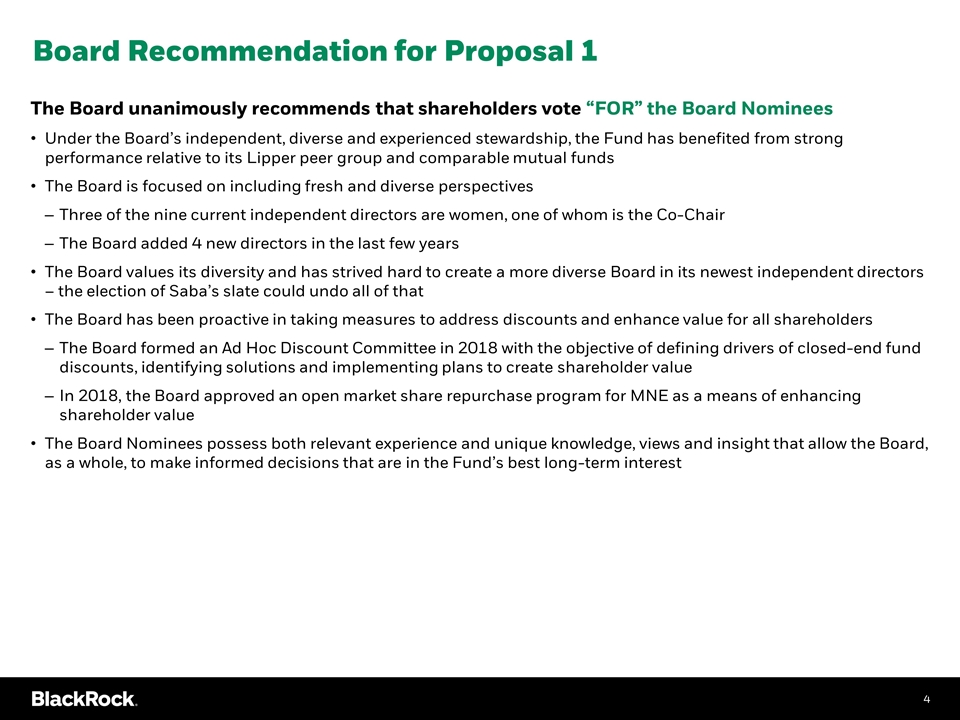
Board Recommendation for Proposal 1 The Board unanimously recommends that shareholders vote “FOR” the Board Nominees Under the Board’s independent, diverse and experienced stewardship, the Fund has benefited from strong performance relative to its Lipper peer group and comparable mutual funds The Board is focused on including fresh and diverse perspectives Three of the nine current independent directors are women, one of whom is the Co-Chair The Board added 4 new directors in the last few years The Board values its diversity and has strived hard to create a more diverse Board in its newest independent directors – the election of Saba’s slate could undo all of that The Board has been proactive in taking measures to address discounts and enhance value for all shareholders The Board formed an Ad Hoc Discount Committee in 2018 with the objective of defining drivers of closed-end fund discounts, identifying solutions and implementing plans to create shareholder value In 2018, the Board approved an open market share repurchase program for MNE as a means of enhancing shareholder value The Board Nominees possess both relevant experience and unique knowledge, views and insight that allow the Board, as a whole, to make informed decisions that are in the Fund’s best long-term interest
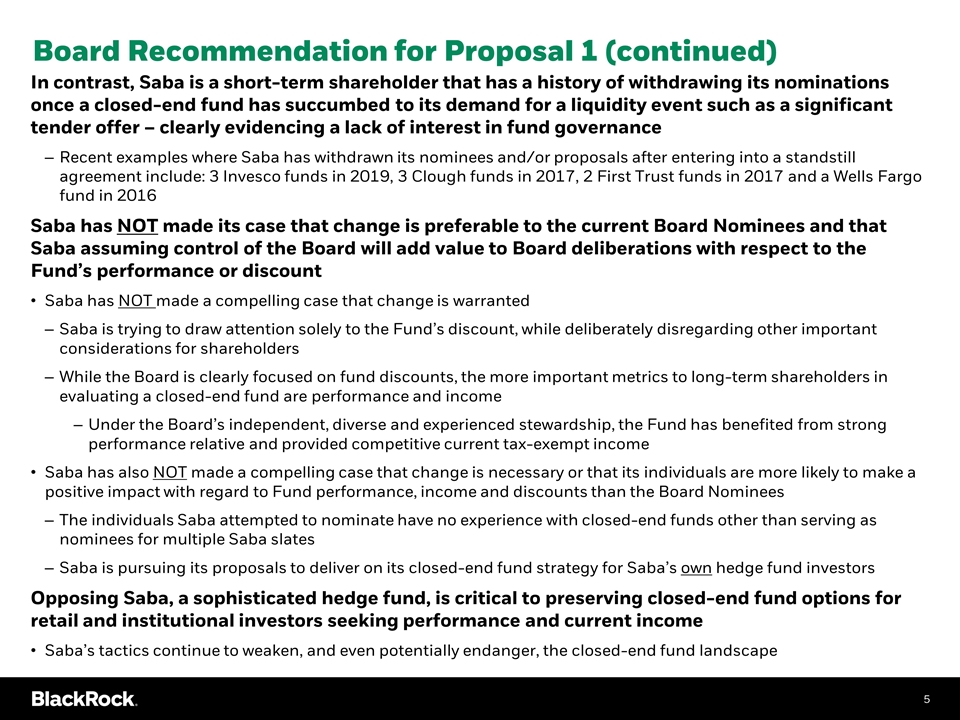
Board Recommendation for Proposal 1 (continued) In contrast, Saba is a short-term shareholder that has a history of withdrawing its nominations once a closed-end fund has succumbed to its demand for a liquidity event such as a significant tender offer – clearly evidencing a lack of interest in fund governance Recent examples where Saba has withdrawn its nominees and/or proposals after entering into a standstill agreement include: 3 Invesco funds in 2019, 3 Clough funds in 2017, 2 First Trust funds in 2017 and a Wells Fargo fund in 2016 Saba has NOT made its case that change is preferable to the current Board Nominees and that Saba assuming control of the Board will add value to Board deliberations with respect to the Fund’s performance or discount Saba has NOT made a compelling case that change is warranted Saba is trying to draw attention solely to the Fund’s discount, while deliberately disregarding other important considerations for shareholders While the Board is clearly focused on fund discounts, the more important metrics to long-term shareholders in evaluating a closed-end fund are performance and income Under the Board’s independent, diverse and experienced stewardship, the Fund has benefited from strong performance relative and provided competitive current tax-exempt income Saba has also NOT made a compelling case that change is necessary or that its individuals are more likely to make a positive impact with regard to Fund performance, income and discounts than the Board Nominees The individuals Saba attempted to nominate have no experience with closed-end funds other than serving as nominees for multiple Saba slates Saba is pursuing its proposals to deliver on its closed-end fund strategy for Saba’s own hedge fund investors Opposing Saba, a sophisticated hedge fund, is critical to preserving closed-end fund options for retail and institutional investors seeking performance and current income Saba’s tactics continue to weaken, and even potentially endanger, the closed-end fund landscape
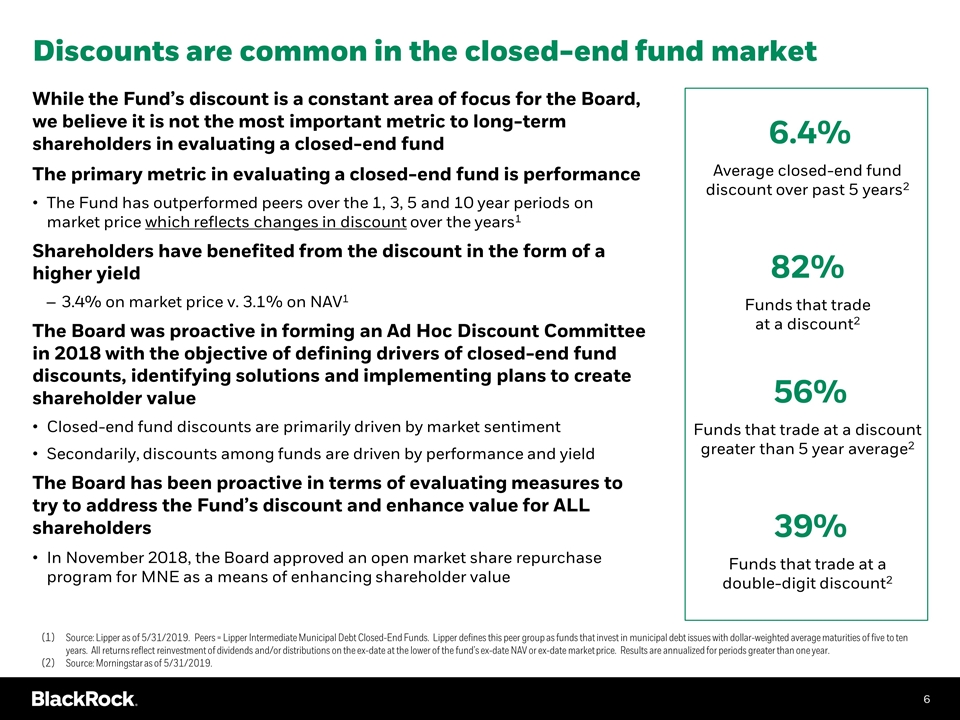
Discounts are common in the closed-end fund market While the Fund’s discount is a constant area of focus for the Board, we believe it is not the most important metric to long-term shareholders in evaluating a closed-end fund The primary metric in evaluating a closed-end fund is performance The Fund has outperformed peers over the 1, 3, 5 and 10 year periods on market price which reflects changes in discount over the years1 Shareholders have benefited from the discount in the form of a higher yield 3.4% on market price v. 3.1% on NAV1 The Board was proactive in forming an Ad Hoc Discount Committee in 2018 with the objective of defining drivers of closed-end fund discounts, identifying solutions and implementing plans to create shareholder value Closed-end fund discounts are primarily driven by market sentiment Secondarily, discounts among funds are driven by performance and yield The Board has been proactive in terms of evaluating measures to try to address the Fund’s discount and enhance value for ALL shareholders In November 2018, the Board approved an open market share repurchase program for MNE as a means of enhancing shareholder value Average closed-end fund discount over past 5 years2 6.4% 82% 56% 39% Funds that trade at a discount2 Funds that trade at a discount greater than 5 year average2 Funds that trade at a double-digit discount2 Source: Lipper as of 5/31/2019. Peers = Lipper Intermediate Municipal Debt Closed-End Funds. Lipper defines this peer group as funds that invest in municipal debt issues with dollar-weighted average maturities of five to ten years. All returns reflect reinvestment of dividends and/or distributions on the ex-date at the lower of the fund’s ex-date NAV or ex-date market price. Results are annualized for periods greater than one year. Source: Morningstar as of 5/31/2019.
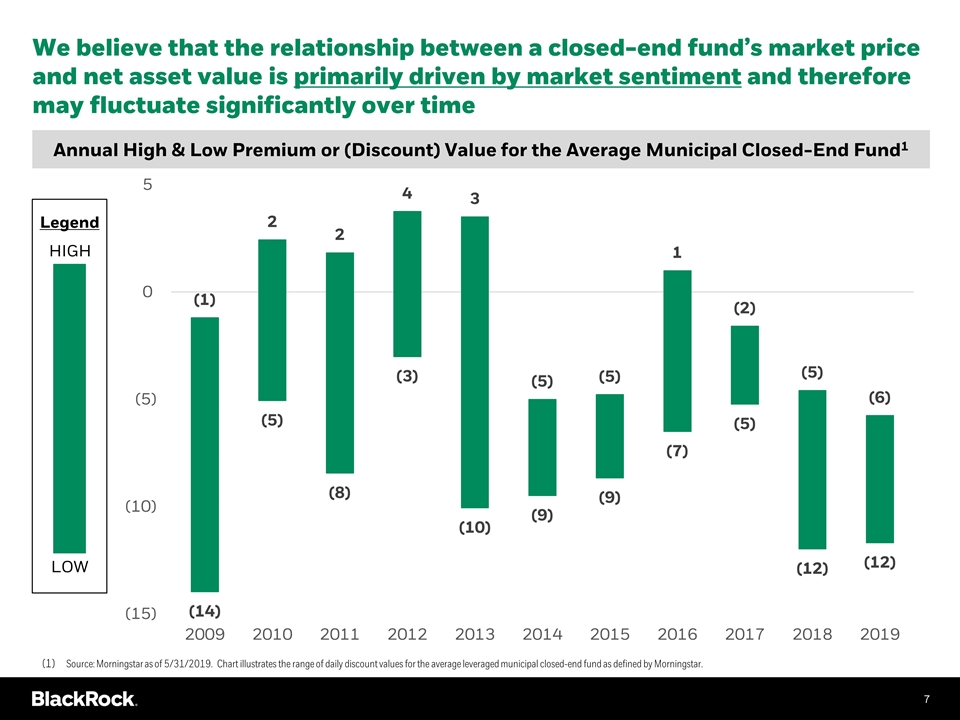
Legend We believe that the relationship between a closed-end fund’s market price and net asset value is primarily driven by market sentiment and therefore may fluctuate significantly over time Annual High & Low Premium or (Discount) Value for the Average Municipal Closed-End Fund1 Source: Morningstar as of 5/31/2019. Chart illustrates the range of daily discount values for the average leveraged municipal closed-end fund as defined by Morningstar. HIGH LOW
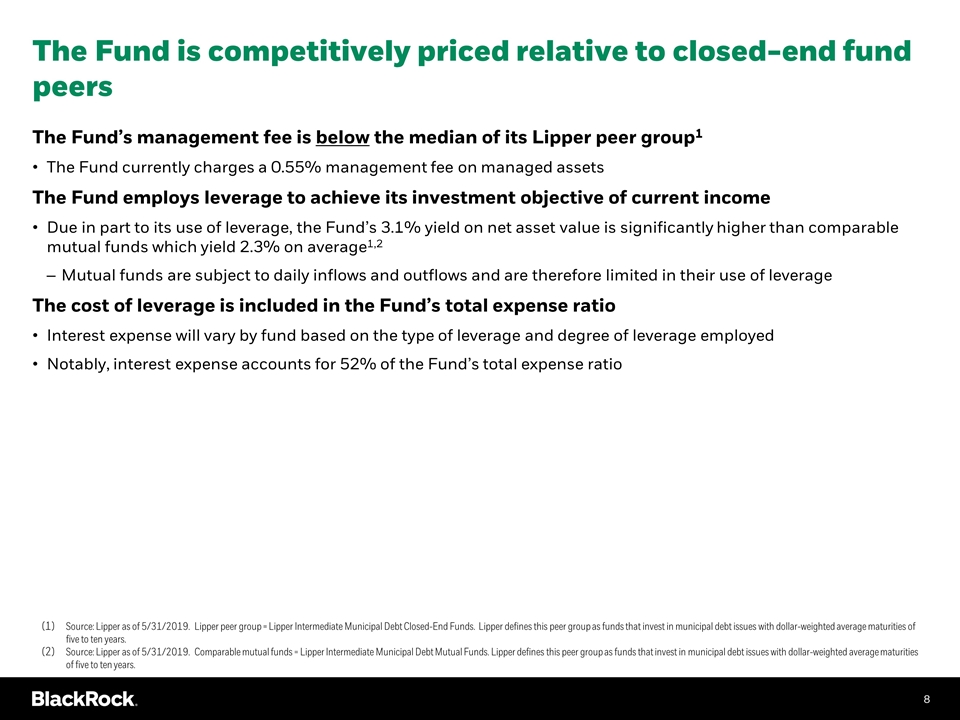
The Fund is competitively priced relative to closed-end fund peers The Fund’s management fee is below the median of its Lipper peer group1 The Fund currently charges a 0.55% management fee on managed assets The Fund employs leverage to achieve its investment objective of current income Due in part to its use of leverage, the Fund’s 3.1% yield on net asset value is significantly higher than comparable mutual funds which yield 2.3% on average1,2 Mutual funds are subject to daily inflows and outflows and are therefore limited in their use of leverage The cost of leverage is included in the Fund’s total expense ratio Interest expense will vary by fund based on the type of leverage and degree of leverage employed Notably, interest expense accounts for 52% of the Fund’s total expense ratio Source: Lipper as of 5/31/2019. Lipper peer group = Lipper Intermediate Municipal Debt Closed-End Funds. Lipper defines this peer group as funds that invest in municipal debt issues with dollar-weighted average maturities of five to ten years. Source: Lipper as of 5/31/2019. Comparable mutual funds = Lipper Intermediate Municipal Debt Mutual Funds. Lipper defines this peer group as funds that invest in municipal debt issues with dollar-weighted average maturities of five to ten years.
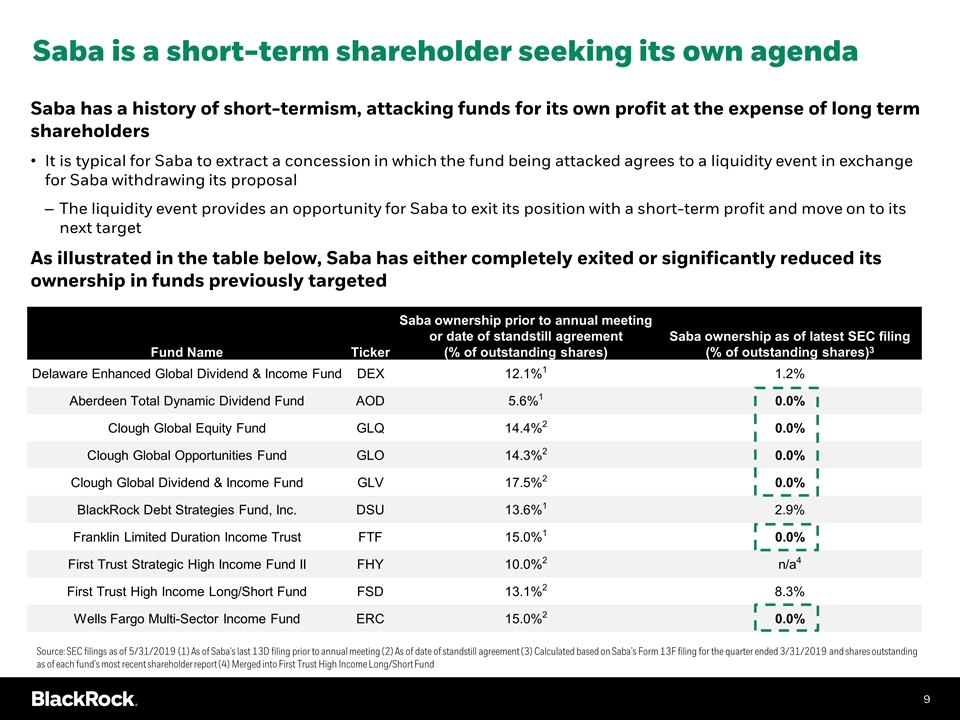
Saba is a short-term shareholder seeking its own agenda Saba has a history of short-termism, attacking funds for its own profit at the expense of long term shareholders It is typical for Saba to extract a concession in which the fund being attacked agrees to a liquidity event in exchange for Saba withdrawing its proposal The liquidity event provides an opportunity for Saba to exit its position with a short-term profit and move on to its next target As illustrated in the table below, Saba has either completely exited or significantly reduced its ownership in funds previously targeted Fund Name Ticker Saba ownership prior to annual meeting or date of standstill agreement (% of outstanding shares) Saba ownership as of latest SEC filing (% of outstanding shares)3 Delaware Enhanced Global Dividend & Income Fund DEX 12.1%1 1.2% Aberdeen Total Dynamic Dividend Fund AOD 5.6%1 0.0% Clough Global Equity Fund GLQ 14.4%2 0.0% Clough Global Opportunities Fund GLO 14.3%2 0.0% Clough Global Dividend & Income Fund GLV 17.5%2 0.0% BlackRock Debt Strategies Fund, Inc. DSU 13.6%1 2.9% Franklin Limited Duration Income Trust FTF 15.0%1 0.0% First Trust Strategic High Income Fund II FHY 10.0%2 n/a4 First Trust High Income Long/Short Fund FSD 13.1%2 8.3% Wells Fargo Multi-Sector Income Fund ERC 15.0%2 0.0% Source: SEC filings as of 5/31/2019 (1) As of Saba's last 13D filing prior to annual meeting (2) As of date of standstill agreement (3) Calculated based on Saba’s Form 13F filing for the quarter ended 3/31/2019 and shares outstanding as of each fund’s most recent shareholder report (4) Merged into First Trust High Income Long/Short Fund
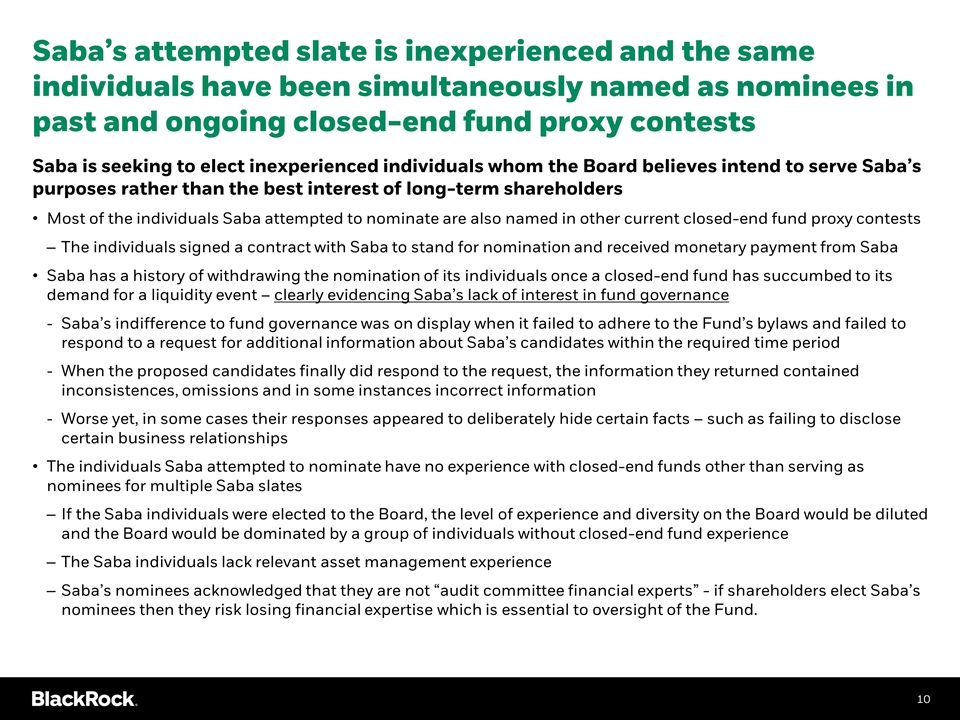
Saba’s attempted slate is inexperienced and the same individuals have been simultaneously named as nominees in past and ongoing closed-end fund proxy contests Saba is seeking to elect inexperienced individuals whom the Board believes intend to serve Saba’s purposes rather than the best interest of long-term shareholders Most of the individuals Saba attempted to nominate are also named in other current closed-end fund proxy contests The individuals signed a contract with Saba to stand for nomination and received monetary payment from Saba Saba has a history of withdrawing the nomination of its individuals once a closed-end fund has succumbed to its demand for a liquidity event – clearly evidencing Saba’s lack of interest in fund governance Saba’s indifference to fund governance was on display when it failed to adhere to the Fund’s bylaws and failed to respond to a request for additional information about Saba’s candidates within the required time period When the proposed candidates finally did respond to the request, the information they returned contained inconsistences, omissions and in some instances incorrect information Worse yet, in some cases their responses appeared to deliberately hide certain facts – such as failing to disclose certain business relationships The individuals Saba attempted to nominate have no experience with closed-end funds other than serving as nominees for multiple Saba slates If the Saba individuals were elected to the Board, the level of experience and diversity on the Board would be diluted and the Board would be dominated by a group of individuals without closed-end fund experience The Saba individuals lack relevant asset management experience Saba’s nominees acknowledged that they are not “audit committee financial experts” - if shareholders elect Saba’s nominees then they risk losing financial expertise which is essential to oversight of the Fund.
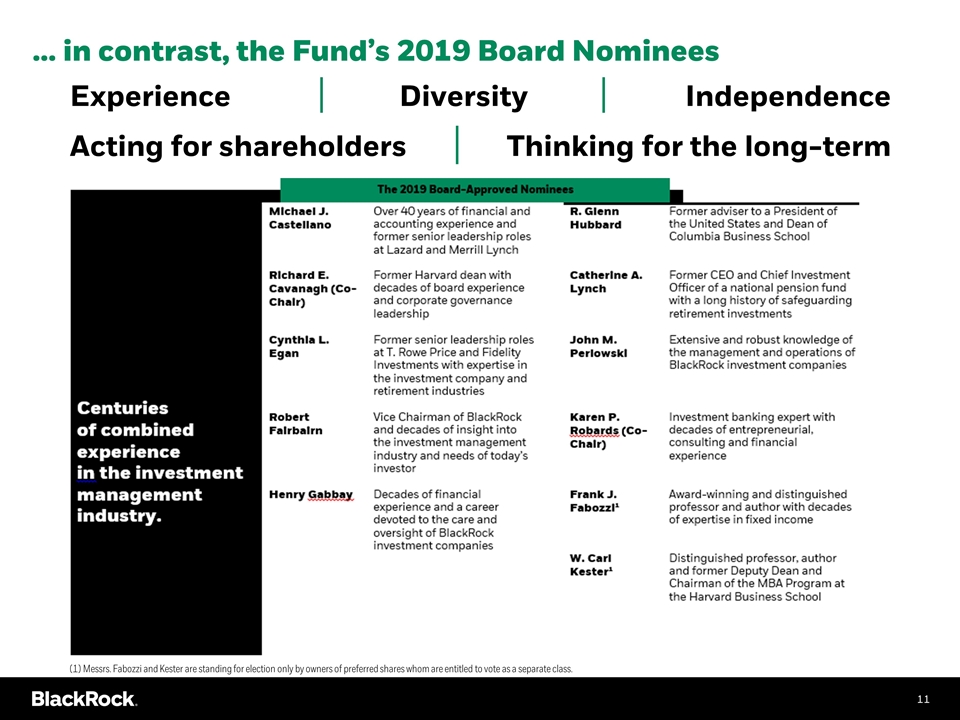
… in contrast, the Fund’s 2019 Board Nominees Experience Diversity Independence Acting for shareholders Thinking for the long-term (1) Messrs. Fabozzi and Kester are standing for election only by owners of preferred shares whom are entitled to vote as a separate class.
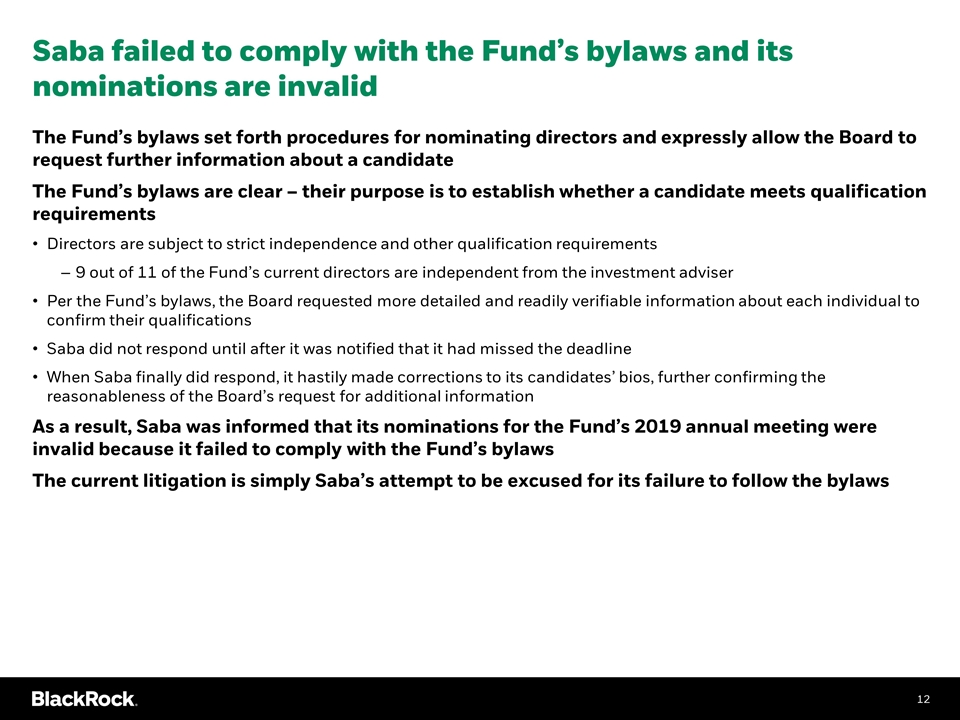
Saba failed to comply with the Fund’s bylaws and its nominations are invalid The Fund’s bylaws set forth procedures for nominating directors and expressly allow the Board to request further information about a candidate The Fund’s bylaws are clear – their purpose is to establish whether a candidate meets qualification requirements Directors are subject to strict independence and other qualification requirements 9 out of 11 of the Fund’s current directors are independent from the investment adviser Per the Fund’s bylaws, the Board requested more detailed and readily verifiable information about each individual to confirm their qualifications Saba did not respond until after it was notified that it had missed the deadline When Saba finally did respond, it hastily made corrections to its candidates’ bios, further confirming the reasonableness of the Board’s request for additional information As a result, Saba was informed that its nominations for the Fund’s 2019 annual meeting were invalid because it failed to comply with the Fund’s bylaws The current litigation is simply Saba’s attempt to be excused for its failure to follow the bylaws
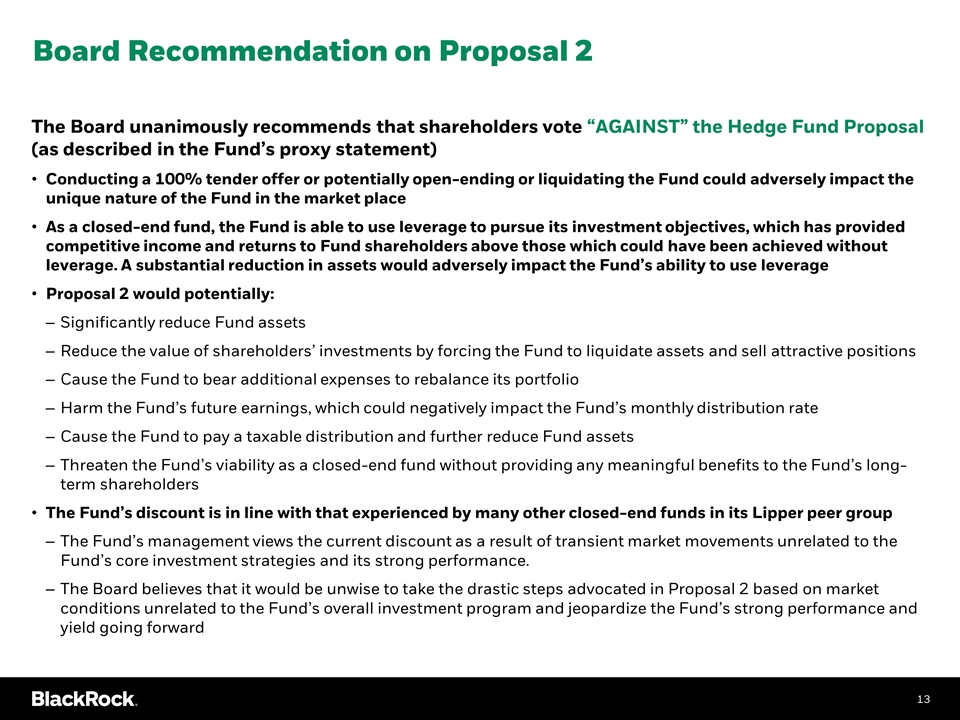
Board Recommendation on Proposal 2 The Board unanimously recommends that shareholders vote “AGAINST” the Hedge Fund Proposal (as described in the Fund’s proxy statement) Conducting a 100% tender offer or potentially open-ending or liquidating the Fund could adversely impact the unique nature of the Fund in the market place As a closed-end fund, the Fund is able to use leverage to pursue its investment objectives, which has provided competitive income and returns to Fund shareholders above those which could have been achieved without leverage. A substantial reduction in assets would adversely impact the Fund’s ability to use leverage Proposal 2 would potentially: Significantly reduce Fund assets Reduce the value of shareholders’ investments by forcing the Fund to liquidate assets and sell attractive positions Cause the Fund to bear additional expenses to rebalance its portfolio Harm the Fund’s future earnings, which could negatively impact the Fund’s monthly distribution rate Cause the Fund to pay a taxable distribution and further reduce Fund assets Threaten the Fund’s viability as a closed-end fund without providing any meaningful benefits to the Fund’s long-term shareholders The Fund’s discount is in line with that experienced by many other closed-end funds in its Lipper peer group The Fund’s management views the current discount as a result of transient market movements unrelated to the Fund’s core investment strategies and its strong performance. The Board believes that it would be unwise to take the drastic steps advocated in Proposal 2 based on market conditions unrelated to the Fund’s overall investment program and jeopardize the Fund’s strong performance and yield going forward
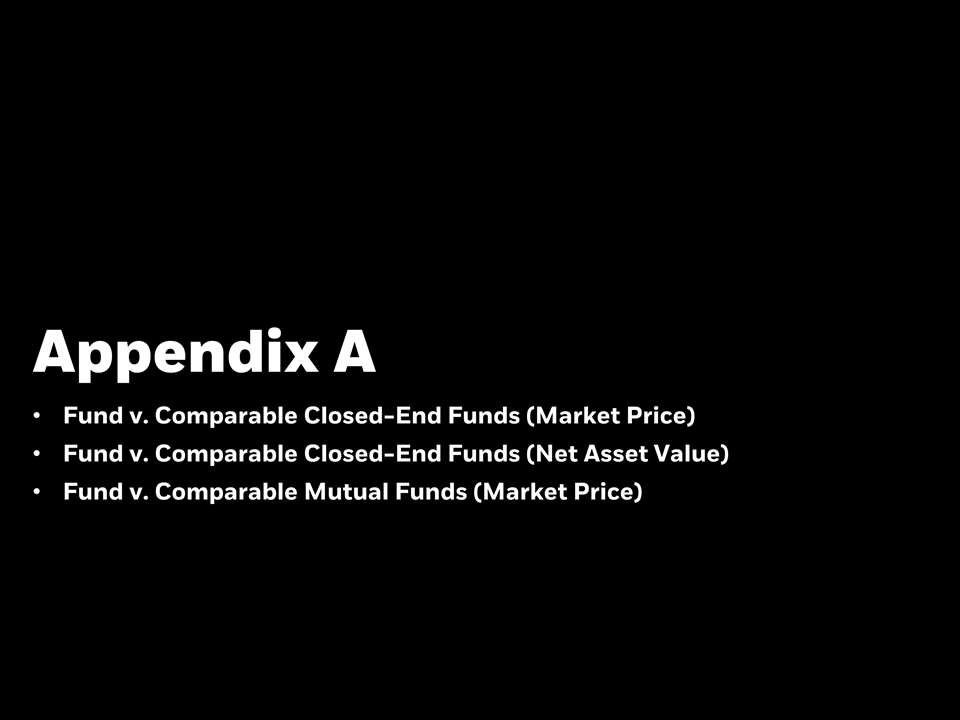
Appendix A Fund v. Comparable Closed-End Funds (Market Price) Fund v. Comparable Closed-End Funds (Net Asset Value) Fund v. Comparable Mutual Funds (Market Price)
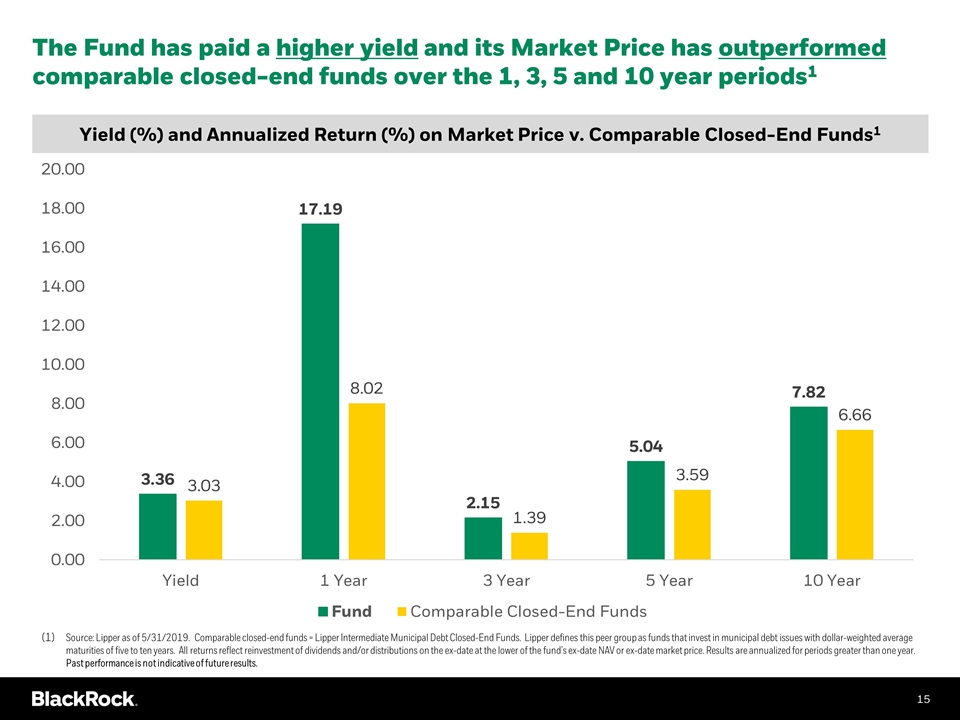
The Fund has paid a higher yield and its Market Price has outperformed comparable closed-end funds over the 1, 3, 5 and 10 year periods1 Yield (%) and Annualized Return (%) on Market Price v. Comparable Closed-End Funds1 Source: Lipper as of 5/31/2019. Comparable closed-end funds = Lipper Intermediate Municipal Debt Closed-End Funds. Lipper defines this peer group as funds that invest in municipal debt issues with dollar-weighted average maturities of five to ten years. All returns reflect reinvestment of dividends and/or distributions on the ex-date at the lower of the fund’s ex-date NAV or ex-date market price. Results are annualized for periods greater than one year. Past performance is not indicative of future results.
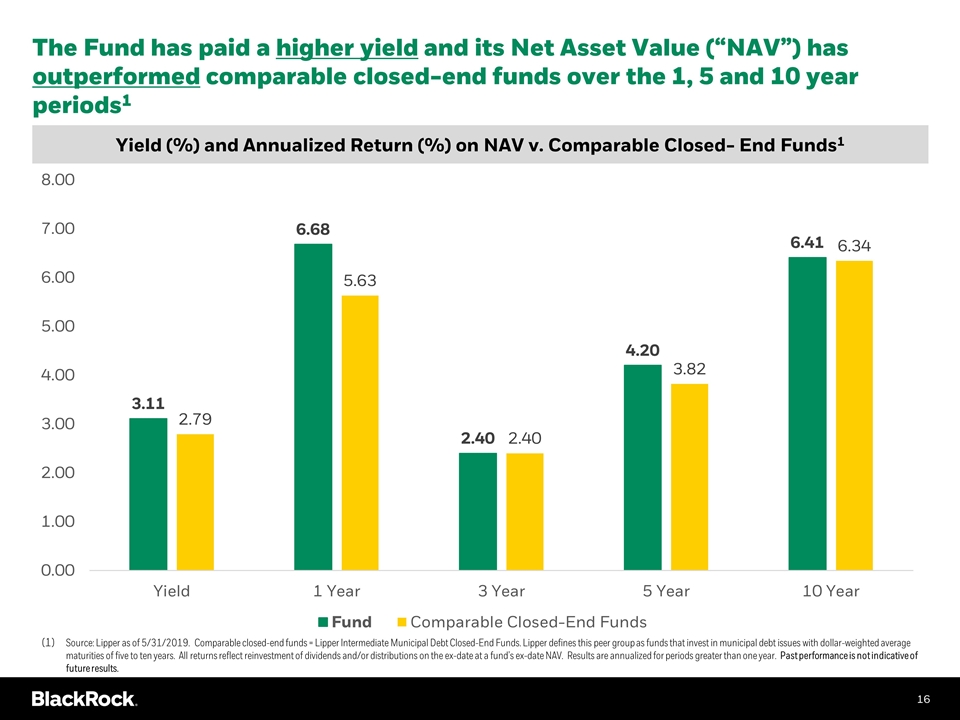
The Fund has paid a higher yield and its Net Asset Value (“NAV”) has outperformed comparable closed-end funds over the 1, 5 and 10 year periods1 Yield (%) and Annualized Return (%) on NAV v. Comparable Closed- End Funds1 Source: Lipper as of 5/31/2019. Comparable closed-end funds = Lipper Intermediate Municipal Debt Closed-End Funds. Lipper defines this peer group as funds that invest in municipal debt issues with dollar-weighted average maturities of five to ten years. All returns reflect reinvestment of dividends and/or distributions on the ex-date at a fund’s ex-date NAV. Results are annualized for periods greater than one year. Past performance is not indicative of future results.
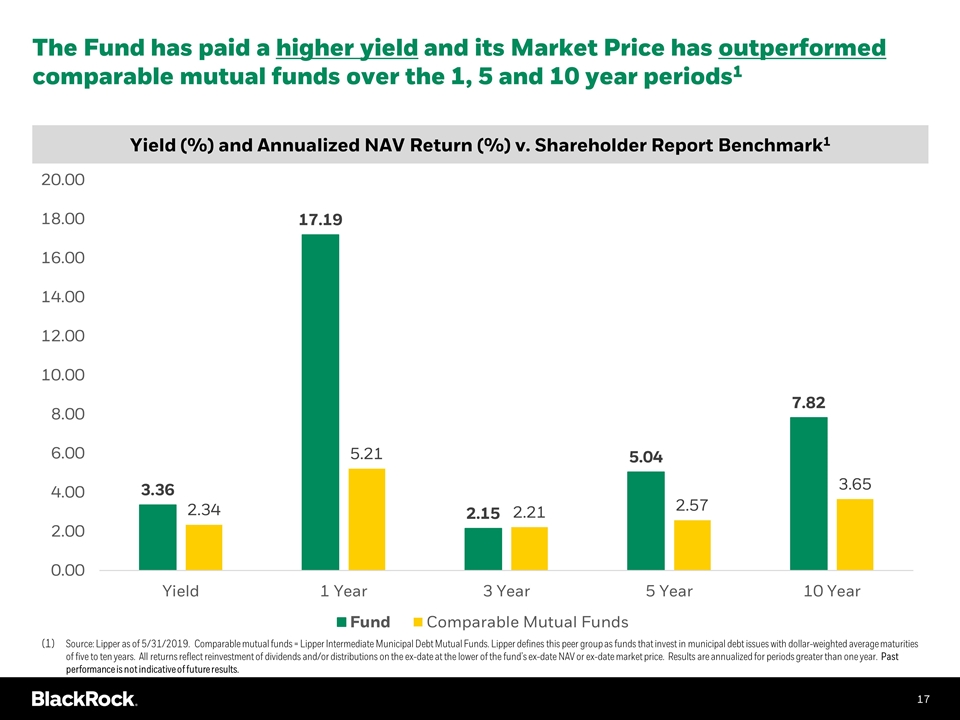
The Fund has paid a higher yield and its Market Price has outperformed comparable mutual funds over the 1, 5 and 10 year periods1 Yield (%) and Annualized NAV Return (%) v. Shareholder Report Benchmark1 Source: Lipper as of 5/31/2019. Comparable mutual funds = Lipper Intermediate Municipal Debt Mutual Funds. Lipper defines this peer group as funds that invest in municipal debt issues with dollar-weighted average maturities of five to ten years. All returns reflect reinvestment of dividends and/or distributions on the ex-date at the lower of the fund’s ex-date NAV or ex-date market price. Results are annualized for periods greater than one year. Past performance is not indicative of future results.
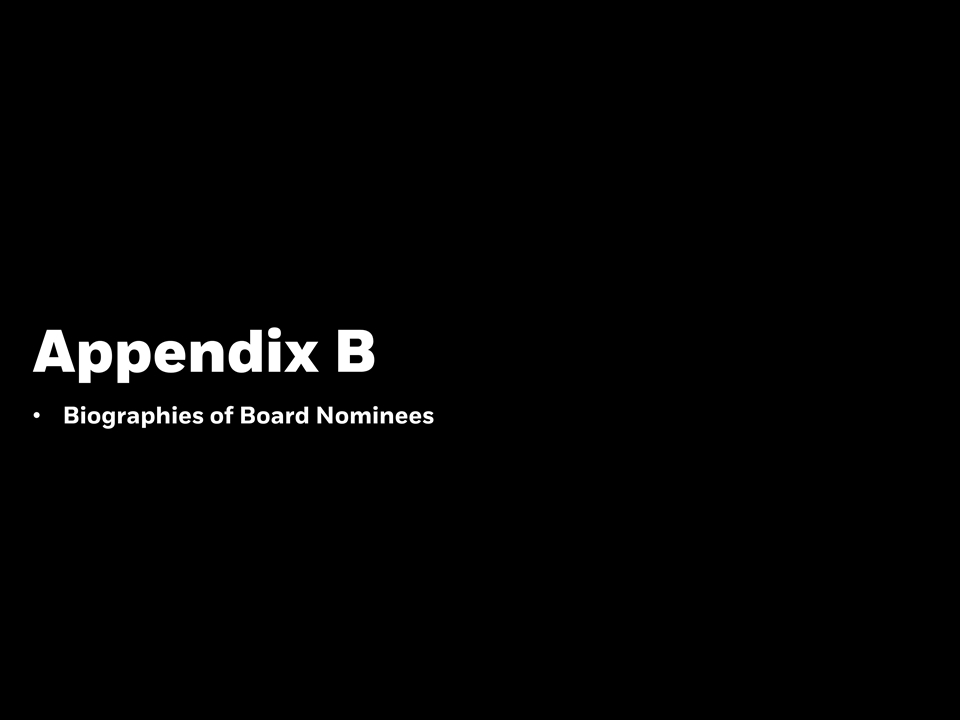
Appendix B Biographies of Board Nominees
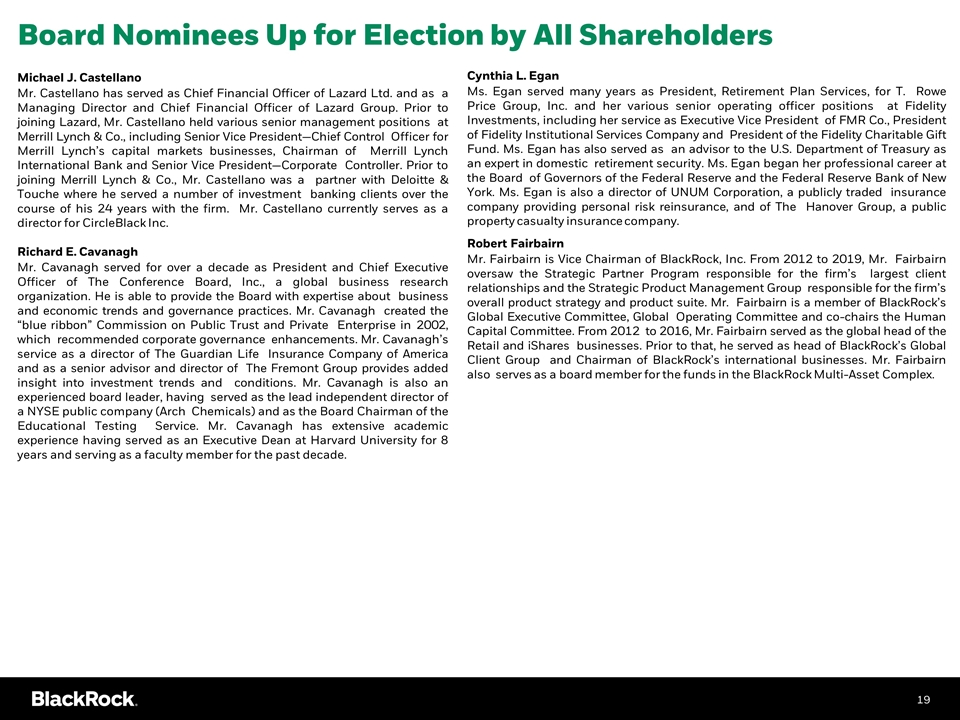
Board Nominees Up for Election by All Shareholders Michael J. Castellano Mr. Castellano has served as Chief Financial Officer of Lazard Ltd. and as a Managing Director and Chief Financial Officer of Lazard Group. Prior to joining Lazard, Mr. Castellano held various senior management positions at Merrill Lynch & Co., including Senior Vice President—Chief Control Officer for Merrill Lynch’s capital markets businesses, Chairman of Merrill Lynch International Bank and Senior Vice President—Corporate Controller. Prior to joining Merrill Lynch & Co., Mr. Castellano was a partner with Deloitte & Touche where he served a number of investment banking clients over the course of his 24 years with the firm. Mr. Castellano currently serves as a director for CircleBlack Inc. Richard E. Cavanagh Mr. Cavanagh served for over a decade as President and Chief Executive Officer of The Conference Board, Inc., a global business research organization. He is able to provide the Board with expertise about business and economic trends and governance practices. Mr. Cavanagh created the “blue ribbon” Commission on Public Trust and Private Enterprise in 2002, which recommended corporate governance enhancements. Mr. Cavanagh’s service as a director of The Guardian Life Insurance Company of America and as a senior advisor and director of The Fremont Group provides added insight into investment trends and conditions. Mr. Cavanagh is also an experienced board leader, having served as the lead independent director of a NYSE public company (Arch Chemicals) and as the Board Chairman of the Educational Testing Service. Mr. Cavanagh has extensive academic experience having served as an Executive Dean at Harvard University for 8 years and serving as a faculty member for the past decade. Cynthia L. Egan Ms. Egan served many years as President, Retirement Plan Services, for T. Rowe Price Group, Inc. and her various senior operating officer positions at Fidelity Investments, including her service as Executive Vice President of FMR Co., President of Fidelity Institutional Services Company and President of the Fidelity Charitable Gift Fund. Ms. Egan has also served as an advisor to the U.S. Department of Treasury as an expert in domestic retirement security. Ms. Egan began her professional career at the Board of Governors of the Federal Reserve and the Federal Reserve Bank of New York. Ms. Egan is also a director of UNUM Corporation, a publicly traded insurance company providing personal risk reinsurance, and of The Hanover Group, a public property casualty insurance company. Robert Fairbairn Mr. Fairbairn is Vice Chairman of BlackRock, Inc. From 2012 to 2019, Mr. Fairbairn oversaw the Strategic Partner Program responsible for the firm’s largest client relationships and the Strategic Product Management Group responsible for the firm’s overall product strategy and product suite. Mr. Fairbairn is a member of BlackRock’s Global Executive Committee, Global Operating Committee and co-chairs the Human Capital Committee. From 2012 to 2016, Mr. Fairbairn served as the global head of the Retail and iShares businesses. Prior to that, he served as head of BlackRock’s Global Client Group and Chairman of BlackRock’s international businesses. Mr. Fairbairn also serves as a board member for the funds in the BlackRock Multi-Asset Complex. 19
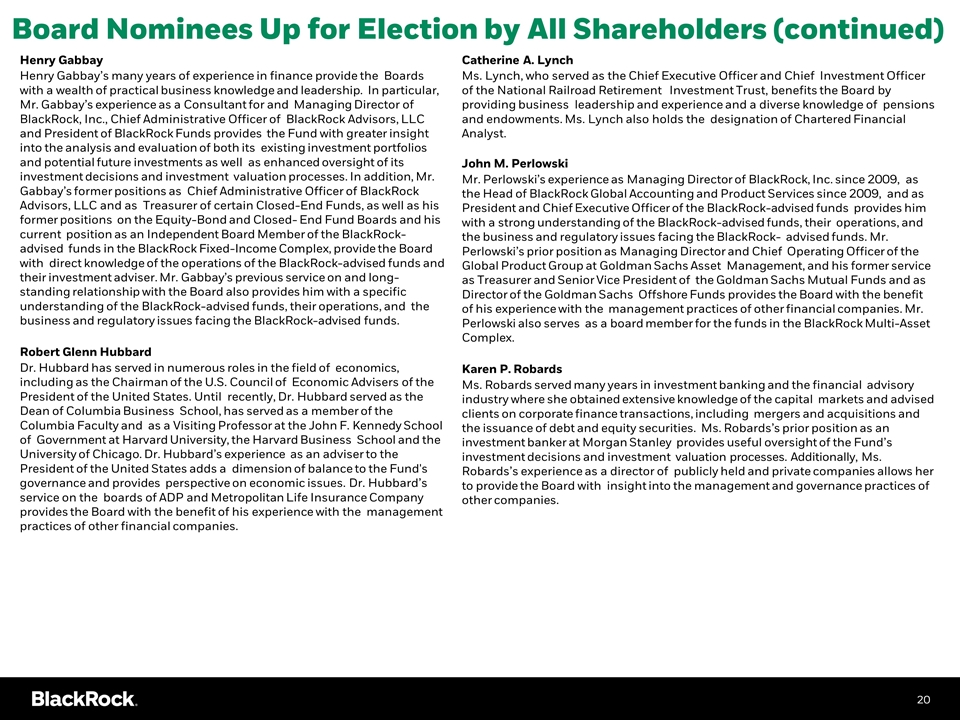
Henry Gabbay Henry Gabbay’s many years of experience in finance provide the Boards with a wealth of practical business knowledge and leadership. In particular, Mr. Gabbay’s experience as a Consultant for and Managing Director of BlackRock, Inc., Chief Administrative Officer of BlackRock Advisors, LLC and President of BlackRock Funds provides the Fund with greater insight into the analysis and evaluation of both its existing investment portfolios and potential future investments as well as enhanced oversight of its investment decisions and investment valuation processes. In addition, Mr. Gabbay’s former positions as Chief Administrative Officer of BlackRock Advisors, LLC and as Treasurer of certain Closed-End Funds, as well as his former positions on the Equity-Bond and Closed- End Fund Boards and his current position as an Independent Board Member of the BlackRock-advised funds in the BlackRock Fixed-Income Complex, provide the Board with direct knowledge of the operations of the BlackRock-advised funds and their investment adviser. Mr. Gabbay’s previous service on and long- standing relationship with the Board also provides him with a specific understanding of the BlackRock-advised funds, their operations, and the business and regulatory issues facing the BlackRock-advised funds. Robert Glenn Hubbard Dr. Hubbard has served in numerous roles in the field of economics, including as the Chairman of the U.S. Council of Economic Advisers of the President of the United States. Until recently, Dr. Hubbard served as the Dean of Columbia Business School, has served as a member of the Columbia Faculty and as a Visiting Professor at the John F. Kennedy School of Government at Harvard University, the Harvard Business School and the University of Chicago. Dr. Hubbard’s experience as an adviser to the President of the United States adds a dimension of balance to the Fund's governance and provides perspective on economic issues. Dr. Hubbard’s service on the boards of ADP and Metropolitan Life Insurance Company provides the Board with the benefit of his experience with the management practices of other financial companies. Catherine A. Lynch Ms. Lynch, who served as the Chief Executive Officer and Chief Investment Officer of the National Railroad Retirement Investment Trust, benefits the Board by providing business leadership and experience and a diverse knowledge of pensions and endowments. Ms. Lynch also holds the designation of Chartered Financial Analyst. John M. Perlowski Mr. Perlowski’s experience as Managing Director of BlackRock, Inc. since 2009, as the Head of BlackRock Global Accounting and Product Services since 2009, and as President and Chief Executive Officer of the BlackRock-advised funds provides him with a strong understanding of the BlackRock-advised funds, their operations, and the business and regulatory issues facing the BlackRock- advised funds. Mr. Perlowski’s prior position as Managing Director and Chief Operating Officer of the Global Product Group at Goldman Sachs Asset Management, and his former service as Treasurer and Senior Vice President of the Goldman Sachs Mutual Funds and as Director of the Goldman Sachs Offshore Funds provides the Board with the benefit of his experience with the management practices of other financial companies. Mr. Perlowski also serves as a board member for the funds in the BlackRock Multi-Asset Complex. Karen P. Robards Ms. Robards served many years in investment banking and the financial advisory industry where she obtained extensive knowledge of the capital markets and advised clients on corporate finance transactions, including mergers and acquisitions and the issuance of debt and equity securities. Ms. Robards’s prior position as an investment banker at Morgan Stanley provides useful oversight of the Fund’s investment decisions and investment valuation processes. Additionally, Ms. Robards’s experience as a director of publicly held and private companies allows her to provide the Board with insight into the management and governance practices of other companies. Board Nominees Up for Election by All Shareholders (continued) 20

Frank J. Fabozzi Dr. Fabozzi has served for over 25 years on the boards of registered investment companies. Dr. Fabozzi holds the designations of Chartered Financial Analyst and Certified Public Accountant. Dr. Fabozzi was inducted into the Fixed Income Analysts Society’s Hall of Fame and is the 2007 recipient of the C. Stewart Sheppard Award and the 2015 recipient of the James R. Vertin Award, both given by the CFA Institute. The Board benefits from Dr. Fabozzi’s experiences as a professor and author in the field of finance. Dr. Fabozzi’s experience as a professor at various institutions, including EDHEC Business School, Yale, MIT, and Princeton, as well as Dr. Fabozzi’s experience as a Professor in the Practice of Finance and Becton Fellow at the Yale University School of Management and as editor of the Journal of Portfolio Management demonstrates his wealth of expertise in the investment management and structured finance areas. Dr. Fabozzi has authored and edited numerous books and research papers on topics in investment management and financial econometrics, and his writings have focused on fixed income securities and portfolio management, many of which are considered standard references in the investment management industry. W. Carl Kester Dr. Kester is a professor and author in finance, and his experience as the George Fisher Baker Jr. Professor of Business Administration at Harvard Business School and as Deputy Dean of Academic Affairs at Harvard Business School from 2006 through 2010 adds to the Board a wealth of expertise in corporate finance and corporate governance. Dr. Kester has authored and edited numerous books and research papers on both subject matters, including co-editing a leading volume of finance case studies used worldwide. Board Nominees Up for Election by Preferred Shareholders 21
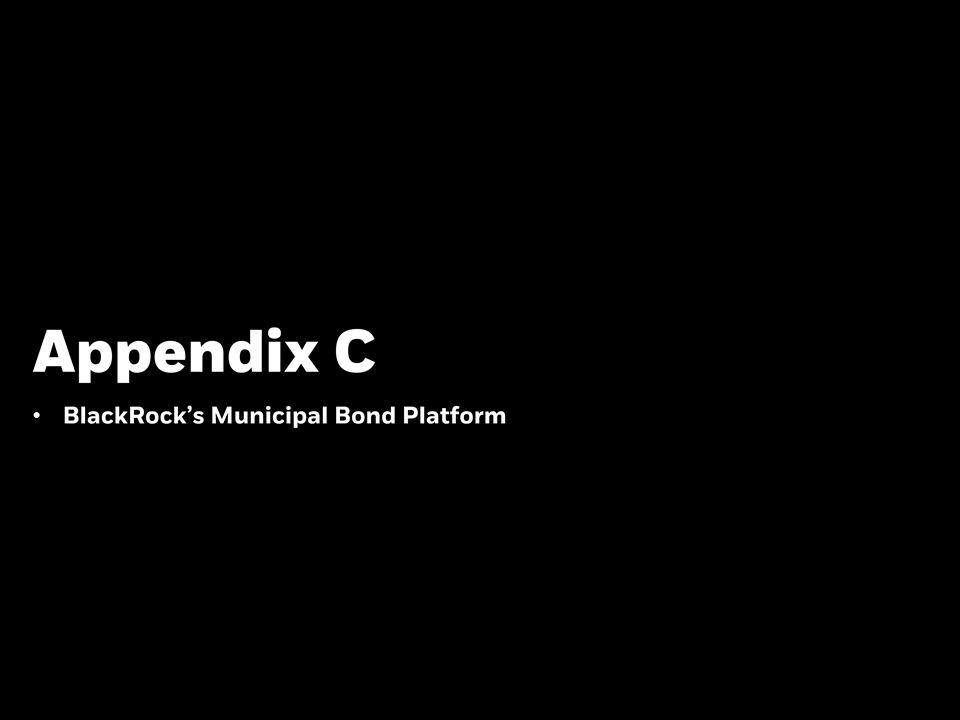
Appendix C BlackRock’s Municipal Bond Platform
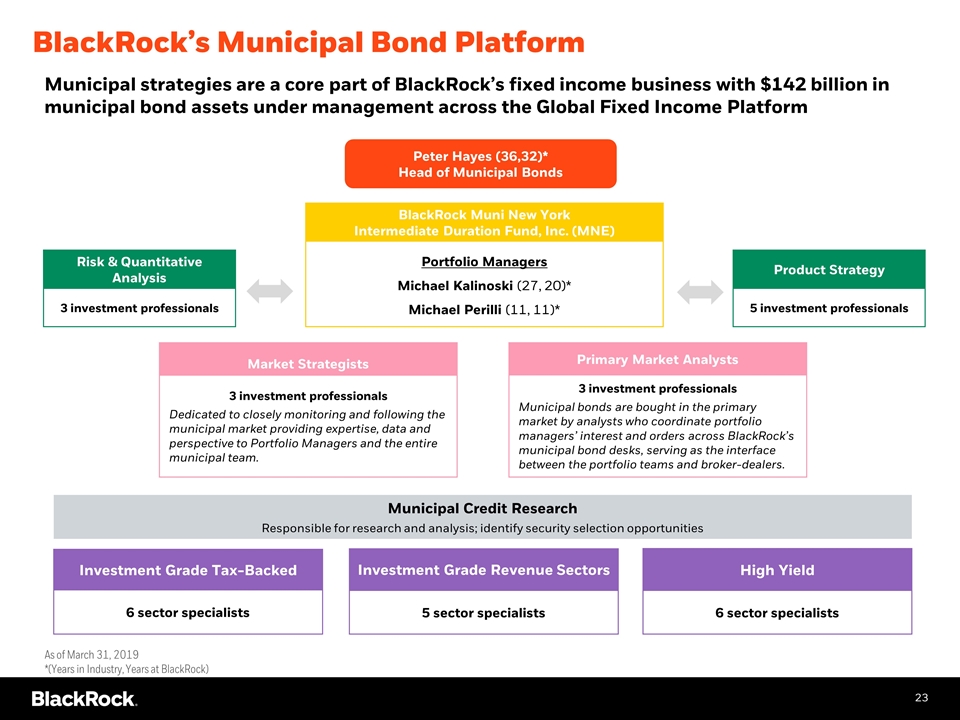
BlackRock’s Municipal Bond Platform As of March 31, 2019 *(Years in Industry, Years at BlackRock) Portfolio Managers Michael Kalinoski (27, 20)* Michael Perilli (11, 11)* BlackRock Muni New York Intermediate Duration Fund, Inc. (MNE) Product Strategy 5 investment professionals Risk & Quantitative Analysis 3 investment professionals Municipal Credit Research Responsible for research and analysis; identify security selection opportunities 6 sector specialists 5 sector specialists High Yield Investment Grade Tax-Backed Investment Grade Revenue Sectors 6 sector specialists Market Strategists 3 investment professionals Dedicated to closely monitoring and following the municipal market providing expertise, data and perspective to Portfolio Managers and the entire municipal team. Primary Market Analysts 3 investment professionals Municipal bonds are bought in the primary market by analysts who coordinate portfolio managers’ interest and orders across BlackRock’s municipal bond desks, serving as the interface between the portfolio teams and broker-dealers. Municipal strategies are a core part of BlackRock’s fixed income business with $142 billion in municipal bond assets under management across the Global Fixed Income Platform 23 ADMASTER-STAMP!FI0218U-419962-1341044 Peter Hayes (36,32)* Head of Municipal Bonds






















